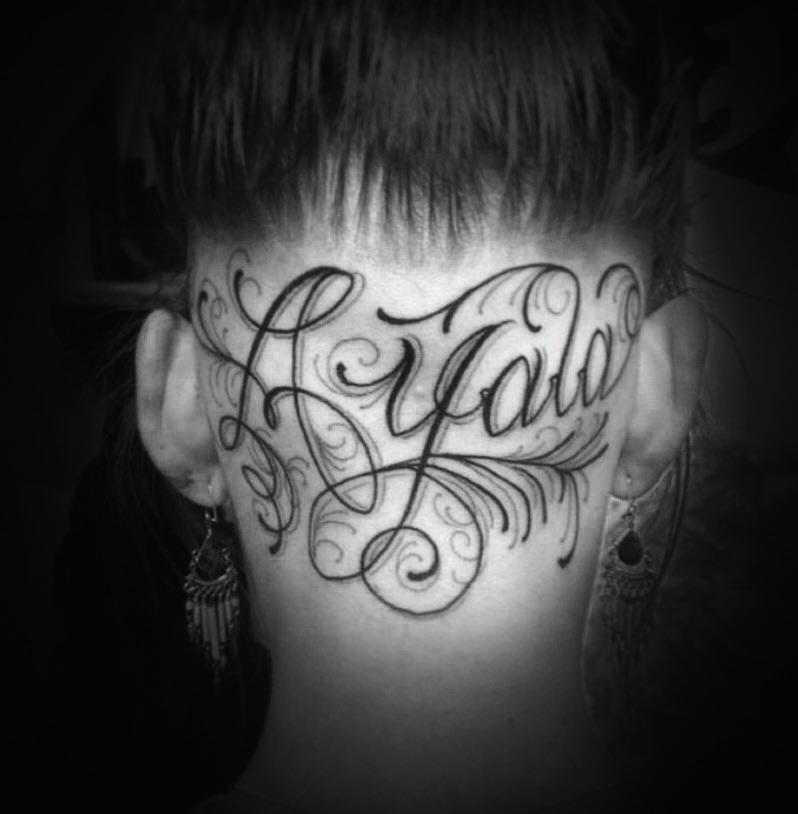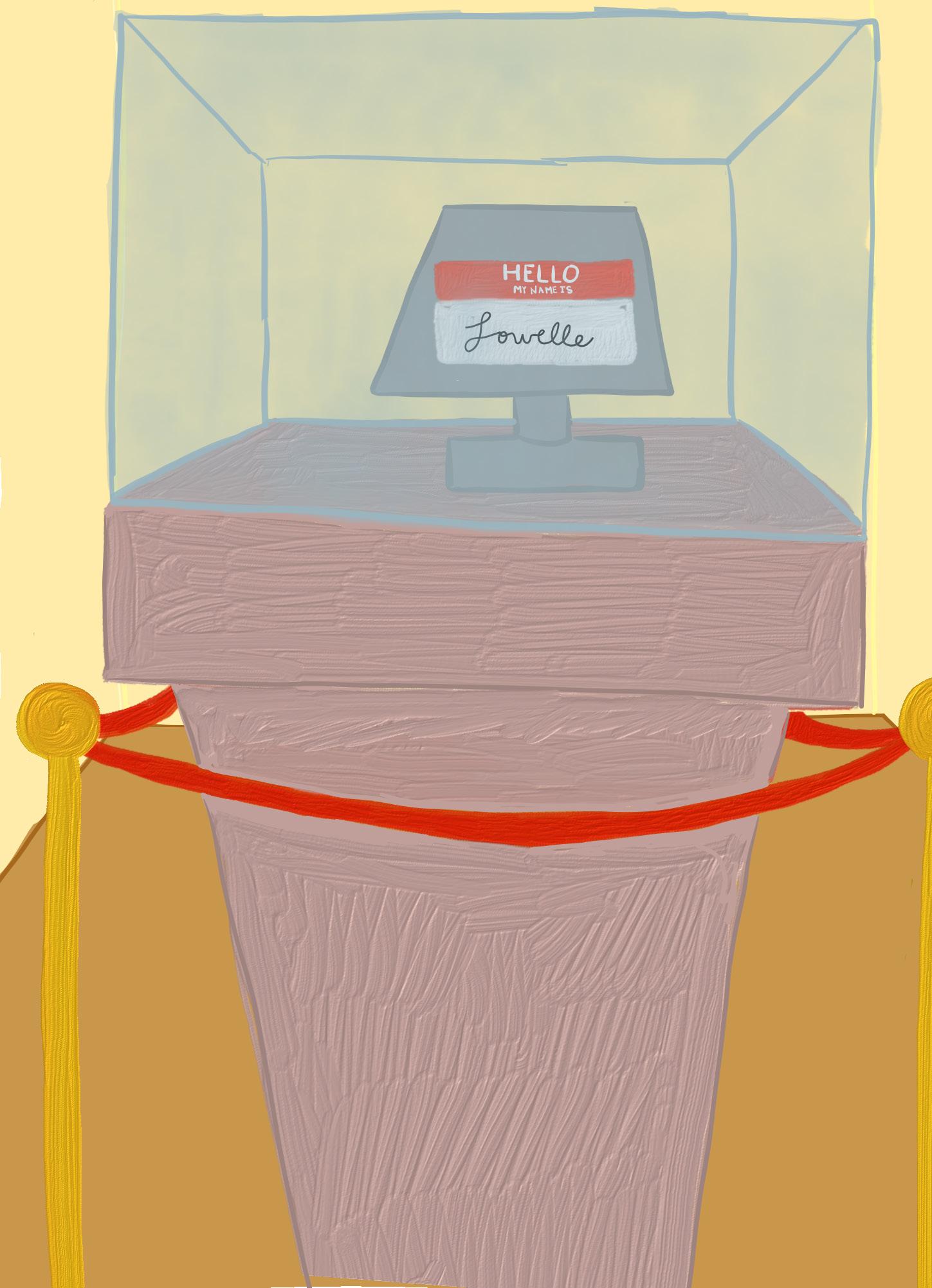
7 minute read
SOCIETY
from OTK Issue 07
by One To Know
What’s in a Name?
By Jade Emerson
Advertisement
Illustrations by Conny Gonzalez
When I changed my name,
I was required to list the reason why I was requesting a name change. It was before 8 a.m. on a Wednesday. I was sitting on a bench in the back of my hometown courtroom. The room was packed. Every few minutes a loud shushing sound came from one of the clerks.
But the chatter and buzz were a good distraction from my own apprehension. Once I checked in, a security guard handed me (yet another) pile of pages to fill out and read to the judge. It was in those pages, between boxes to check and blanks to initial, I found that question: Why was I doing this? I was given five lines to answer it. As I zipped through the rest of the questions (most I had answered so many times they were memorized), it kept buzzing in my mind until it was the only question left. I tried to hurry and think of something to scribble down. It had taken me enough courage to get this far, and I was scared any delays would stall me for good. I wanted to fill those five lines with how unfair I thought names were. Women in their lives are given the names of their fathers, then their husbands. They are given the names of men. But what about their own names? How different would history look if it was charted under different names?
I wanted to write about how as a writer, my name (my byline) was everything to me. I didn’t think it was too much to ask that stories, degrees and awards be under my own name instead of someone else’s.
I wanted to write about how women are denied permanence in their identity. They are expected to mold and mesh to meet the expectations of tradition. A man is allowed to have one name his entire life. But girls? We grow up imagining how different last names would sound in place of ours. We grow up accepting that when it comes to how we’re known by others, change is inevitable.
I wanted to fill those five lines with a new question: How can we own our accomplishments, our bodies and our voices if we can’t even choose the name they belong to? But I didn’t write any of that. I settled on something simple, yet as true as I could muster.
“I want a name that feels like my own.”
For a large part of history, women haven’t been given much ownership of anything. Instead, we have been owned. Our names used to signal which man we belonged to, who defined us more than we defined ourselves.
And often in those names, there is beauty. I know so many women who hold pride in their names, both maiden and married. Their names carry their family, their past, their future, their heritage. Their names are filled with love. But I also know women whose names are filled with pain. It’s a brand they didn’t ask to wear, a cut that opens every time they say it aloud.
When Kimberly Lowelle Seward got married in her early 20s, she took her husband’s last name. It wasn’t something she put much thought into — it’s just what people did, she says. “I think I have some resentment now that as women, we have to do that,” Kimberly says. “I don’t know if we should have to change our names in order to create a life with somebody. Not everybody does that or not; people don’t but it is still the expectation.”

Years later, when she got a divorce in her 40s, she knew she didn’t want her ex-husband’s last name anymore. Yet she also didn’t want to go back to her maiden name. She wanted something that was hers entirely. Something new. Something untouched.
So Kimberly, her youngest daughter and her friend sat down together in her living room and decided to create a new last name. She started by taking her mother’s maiden name — Low — because she knew she wanted to feel a connection to her mom whom she lost at a young age. But she added a new ending — elle. She gave herself a last name that no one in the world had: Lowelle. “It felt very empowering, and it felt very liberating,” Kimberly says. “I felt like I was getting away with something that we don’t always get to do. I was making a choice, making the statement.”
She took her divorce papers to the Department of Motor Vehicles to get a new driver’s license. Next, she headed to Costco. Using her divorce papers and new driver’s license, she was able to update her membership card, giving her a second photo ID. Her Costco card became the key to her new identity. “I just did it. I just made the decision. And I’ve acted on it. I didn’t ask anybody’s permission.”
With her two photo IDs, she was able to change her passport and social security. She carved her new name into something permanent. “For me, even the act of rebellion, of saying ‘I’m going to choose my own name, thank you very much,’ even that was a defining moment of my life story,” Kimberly says. “I am not anybody’s property.”

Photo Courtesty Sarah Ayala
“I got the tattoo of my last name in 2014 when I suddenly
had a fear of possibly not having the name in the future, since it’s something we sometimes shed as women once married. I didn’t have much direction in my life at the time, but I did know I wanted to keep Ayala with me wherever I went, and in turn keeping my family and its values with me always. It’s important to me today because I’ve never once second-guessed the tattoo decision and have used it in moments when I needed strength and grounding. With more direction and selfassurance in my life now, I know that I will never be without this name legally if I choose not to do so.”
- SARAH AYALA
Kimberly’s daughter decided to take the new last name as well. “It kind of brought us together. We were making a stand that we were going on with our lives,” she says.
Yet often, changing a name doesn’t come as easily as getting a Costco card. Costly court fees, time and piles of paperwork prevent many people from making a choice about changing their names. “That is where the message is being given very clearly: Your name is not yours to choose. If you didn’t have the money and you didn’t have the intellectual wherewithal to navigate that set of forms, it wouldn’t have worked. You couldn’t have done it,” Kimberly says. “That is a very strong message from our society: It’s not OK for a woman to be her own person.”
Kimberly loves her new last name. She smiled and described the joy of writing it in cursive, with the motion of the letters flowing together. She says the process of picking her own last name was like naming a child. “You have to explore all the avenues and all the little corners, until you go, ‘I think this is who I am.’ This is who I am,” Kimberly says.

Kimberly, now married and living in England with her husband, still uses Lowelle as a middle name. She says she doesn’t feel like there’s a right or wrong choice when it comes to taking a last name or creating a new one. Her new name, just as her last, carries its own special meaning to her.
“When I got married, I needed to be related to somebody. It was a choice to marry into a family and to share my husband’s name and his life,” she says. “And that was a choice. It didn’t feel like an expectation.”
For me, when the judge tapped his gavel, officially changing my name, I think I forgot to breathe. And then the breaths came easily. For perhaps the first time in my entire life, I felt like my own name truly belonged to me. I was liberated. I was light. I no longer had to carry the weight of someone else’s name. For me, choosing my own last name meant that I belonged to myself. And it’s a feeling I never want to lose.










